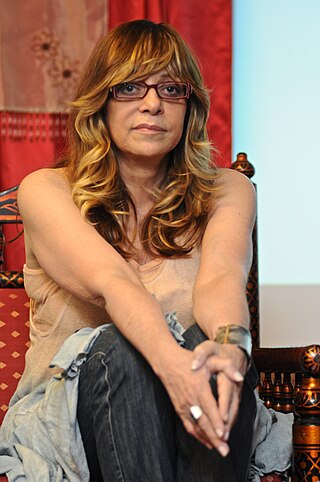Betty Milan | |
|---|---|
 | |
| Born | Elizabeth Milan Mangin 5 August 1944 |
| Occupations |
|
Elizabeth Milan Mangin (born 5 August 1944), known as simply Betty Milan, is a Brazilian Lacanian psychoanalyst who became an essayist, a novelist and a playwright.
Betty Milan | |
|---|---|
 | |
| Born | Elizabeth Milan Mangin 5 August 1944 |
| Occupations |
|
Elizabeth Milan Mangin (born 5 August 1944), known as simply Betty Milan, is a Brazilian Lacanian psychoanalyst who became an essayist, a novelist and a playwright.
Elizabeth Milan Mangin was born São Paulo on 5 August 1944. Her parents were children of immigrants from Lebanon. She spent her early childhood in Vila Esperança, a neighbourhood on the outskirts of São Paulo. At 18, she entered the Faculty of Medicine of the University of São Paulo, with the intention of becoming a psychiatrist. Taking the opportunity to observe courses at the Faculty of Philosophy, Science and Letters, she met French intellectuals, such as Michel Serres and Michel Foucault and, through them, became interested in French culture. Graduating in 1968 she took internships in Brazil and also in Scotland in a directed therapeutic community under psychiatrist Maxwell Jones. She also studied psychodrama and psychoanalysis. In December 1969 she went to study with Zerka T. Moreno at the Moreno Institute in Beacon, New York. At the age of 29, she defended a doctoral thesis in psychiatry at the Faculty of Medicine of the University of São Paulo and, a year later, in 1974, went to France to undergo therapy with and subsequently work with Jacques Lacan, for whom she became a translator and assistant at the University of Paris VIII. [1] In 2021 she published Lacan ainda: Testemunho de uma análise, about her experiences with Lacan. [2] [3] [4]
Shortly before finishing her training in psychoanalysis and returning to Brazil, Milan wrote her first novel, O Sexphuro. Her work with Lacan resulted, in 1991, in the novel O Papagaio e o Doutor (The Parrot and the Doctor), which was translated into French and Spanish. In Brazil she settled in Rio de Janeiro, conducted research on the Rio Carnival and taught at the Colégio Freudiano, an association founded in 1975 by her together with the psychoanalyst Magno Machado Dias. [5] The research carried out on the samba schools of Rio de Janeiro, in 1988, led to Os bastidores do Carnaval (The Backstories of Carnival), which was the first time that carnival artists had been taken seriously at the intellectual level. As part of her research she met the Carnival director, Joãosinho Trinta, who helped her to realise the importance of play within the Brazilian culture. Her subsequent essay O que é o amor (What is love), which relates play to love, became extremely controversial. Later, one of the chapters in the book was adapted for the theatre, under the name, Paixão (Passion). [1] [6]
Milan returned to Paris in 1985 to live and write O Papagaio e o Doutor. During this period, she also wrote other papers, including the essay, O País da Bola (The Country of the Ball). Translated and published in France during the 1998 World Cup, the book was well received by the French press. From 1991 to 1994, she wrote A paixão de Lia (Lia's passion), a novel that merges eroticism and lyricism. Before the release of the French version of O Papagaio eo Doutor, she wrote a series of 29 stories about Paris, which were first published in São Paulo's Jornal da Tarde , and later collected in a book. From 1993, she started doing special interviews for Folha de S. Paulo , a newspaper with which she has collaborated since 1980. This gave her the opportunity to interview writers, artists and thinkers such as Nathalie Sarraute, Octavio Paz, Michel Serres, Jacques Derrida, and Françoise Sagan. The interviews were gathered in the book A Força da Palavra (The Power of the Word) in 1996. [7] Folha de S. Paulo then commissioned ten interviews with leading European intellectuals, which were brought together in O Seculo (The Century), which received an award from the Associação Paulista dos Críticas de Arte in 1999. [1]
In 2002, Milan began to use the internet to communicate, with question-and-answer sessions. She adapted A paixão de Lia for the theatre. In November 2003, she released the novel O Amador Brasileiro (The Brazilian Amateur). This was also adapted for the stage and premiered in August 2004. In 2005, she wrote the play Brasileira de Paris, which was first performed on 8 March 2006, International Women's Day. She became a columnist for Folha de S. Paulo in 2005, answering questions about love, sex and death. In 2007 she became a columnist for the online version of the weekly magazine, Veja. [8] In 2012, she wrote A vida é um theatre (Life is a theatre), which was staged at the Teatro da Livraria da Vila in São Paulo. In 2014, she represented contemporary Brazilian literature at the Miami International Book Fair in the USA. In 2016, she published A Mãe Eterna (The Eternal Mother), a novel about the transition from the condition of a daughter to that of a mother's mother, focusing on extreme old age. She published Diaspora, Psychoanalysis and Literature in Brazil, and gave a series of conferences in the United States in 2018 on this topic, speaking at Georgetown University, Johns Hopkins University and the New York School of Art. Milan'’s most recent novel is Baal, which draws on her Lebanese roots, and in 2019, she was honoured by the Minister of Foreign Affairs of Lebanon "for her contribution to the country of her ancestors". [1] [3] [9]

Hilda de Almeida Prado Hilst was a Brazilian poet, novelist, and playwright. Her work touches on the themes of mysticism, insanity, the body, eroticism, and female sexual liberation. Hilst greatly revered the work of James Joyce and Samuel Beckett, and the influence of their styles—like stream of consciousness and fractured reality—is evident in her own work.

Liberdade is the name of a district in the subprefecture of Sé, in São Paulo, Brazil. By various estimates, it is home to the world's largest ethnic Japanese community outside Japan.

Moacyr Jaime Scliar was a Brazilian writer and physician. Most of his writing centers on issues of Jewish identity in the Diaspora and particularly on being Jewish in Brazil.
Lúcia Machado de Almeida was a Brazilian writer. She was born in the Nova Granja farm, in São José da Lapa city, state of Minas Gerais. She moved to Belo Horizonte when she was a child. After that, she studied until High School at the Santa Maria school, in the same city. She learnt English, French, history of arts and music.

Nélida Piñon was a Brazilian author and professor. At the time of her death, Piñon was "considered among the foremost writers in Brazil today".

João Ubaldo Ribeiro was a Brazilian writer, journalist, screenwriter and professor. Several of his books and short stories have been turned into movies and TV series in Brazil. Ribeiro was a member of the Brazilian Academy of Letters, being elected in 1994. At the time of his death many considered him to be Brazil's greatest contemporary novelist.

Marcelo Fromer was the guitarist of Brazilian rock band Titãs. One of the founding members and also the band's manager, he died in 2001, after being hit by a motorcycle while jogging.

Glória Maria Rebelo Ferrante is a Brazilian screenwriter.

Maria Fernanda Cândido is a Brazilian actress, television presenter, and former model.

The São Paulo Prize for Literature is a Brazilian literary prize for novels written in the Portuguese language and published in Brazil. It was established in 2008 by the Secretary of Culture for the State of São Paulo. Though not as old as other literary prizes in Brazil, such as the Machado de Assis Prize, the São Paulo Prize has quickly risen in prestige. For example, in 2011, there were 221 submissions for the prize. This rapid rise in popularity is partly because of the large cash prize. Every year two prizes of R$200,000 each are awarded—one for the best novel of the year by an established author, and the other for the best novel of the year by a debut author—making the São Paulo Prize the largest prize for a published work in Brazil, and one of the largest literary prizes in the world. Ten finalists are listed for each award, during the Festival da Mantiqueira, and the winners are announced on the first Monday of August in the Museum of the Portuguese Language.

Cristóvão Tezza is a Brazilian novelist and university professor.

Ruth Pinto de Souza was a Brazilian actress.
Maria Evangelina Leonel Gandolfo, known as Vange Leonel, was a Brazilian singer-songwriter, rhythm guitarist, journalist, blogger, cronista, novelist, playwright, beer sommelier, and feminist and LGBT rights activist. Known for her distinctive soulful, bluesy vocals heavily inspired by Billie Holiday and Janis Joplin, she was famous for her work with post-punk band Nau, active from 1985 to 1989, before beginning a solo career in 1991.

Ruth Guimarães Botelho was the first Afro-Brazilian author to gain a national audience and critical attention for her novels, short stories, and poetry. A classical scholar, she translated works from French, Italian and Spanish and studied Greek and Latin, though her works reflected fables, folklore, herbal medicines and legends of Afro-Brazil. She established several cultural preservation societies, served as head of the Ministry of Culture for Municipality of Cruzeiro, São Paulo, and was a member of the São Paulo Academy of Letters.

Tatiane "Tati" Bernardi Teixeira Pinto is a Brazilian short story writer, novelist, cronista, screenwriter and journalist. Her works are particularly directed towards young women.

Vida Amélia Guedes Alves was a Brazilian actress and pioneer of early Brazilian television whose career spanned more than seventy years. In 1951, Alves made history when she and actor Walter Forster performed the first on-screen kiss ever broadcast on Brazilian television on the early telenovela series, Sua Vida Me Pertence. In 1963, Alves made television history once again by sharing the first gay kiss shown on Brazilian television with actress Geórgia Gomide on the teleteatro show, TV de Vanguarda.

Mylla Christie Vitta Sartori is a Brazilian actress, model, singer, television presenter and businesswoman.
Jaci dos Santos, better known as Thereza Santos, was a Brazilian writer, actor, playwright, professor, and activist for women's rights and for the Black Movement of Brazil for over five decades.

Contardo Luigi Calligaris was an Italian-Brazilian writer, psychoanalyst and dramaturg. He was a weekly columnist at Folha de S. Paulo, a daily publication regarded as a newspaper of record in Brazil.

Vladimir Pinheiro Safatle is a Brazilian philosopher, writer and musician. He is a professor of Theory of Human Sciences at the Faculty of Philosophy, Languages and Human Sciences, University of São Paulo. His intellectual production focuses on the areas of epistemology of psychoanalysis and psychology, political philosophy, critical theory and philosophy of music.